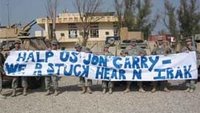Back before Christmas, I wrote a post about my sense of calling. It generated a lot of buzz, from church members and bloggers alike. Some people really seemed to “get it,” some were concerned for my mental health, and some were quick to … shall we say … “encourage” me to just get over it and do my job.
At the time of my writing it, I was in over my head in terms of trying to get done simply what needed to get done, and I had momentarily lost contact with the foundational sense of my calling to ministry. I asked several dear friends to again remind me of why it was exactly I was doing this pastor thing, and they did, and I’m okay now. Experiencing Christmas helped, too.
I just have one more thought to add. In the comments of that post, a couple of people mentioned “survival.” Adam wrote: “But I guess unless I want to move out to the forest, or really push the envelope of living in our society, i'll have to do what i'm not called to do to survive!” And Codepoke wrote: “The modern pastor's job is almost unsurvivable.” That got me to thinking a bit.
Seems to me that there must be a distinction between living out your calling and doing what is necessary to survive. See, I don’t want to “survive” as a pastor, I want to strive to realize my full potential, to flourish, to thrive. I guess survival mode means doing all the stuff because you have to do it, period. There’s nothing underneath in which to ground it, only survival itself. And that’s where I was a couple of weeks ago - just doing the bare minimum. It didn’t feel good, and it showed in my writing.
I know, I know – “Boo-hoo, Andy. Get over it!” Listen, I know people who have been forced into true survival mode by the vicissitudes of life, and it absolutely consumes them. I am not remotely trying to do any comparison thing, here.
So here’s where I am now. Having come through that little down-time a bit, I am in touch again with my calling to ministry, which means that I’m still doing all the stuff I ever did, but now there is some fertile soil in which it can take root, be grounded. It’s not that I’ll have to do what I’m not called to do just to survive. It’s more like my calling will undergird everything I do as a pastor. Even balance budgets and read forwarded emails!
God is good!
Sermon for the First Sunday of Lent, Feb. 18, 2024
2 months ago


















